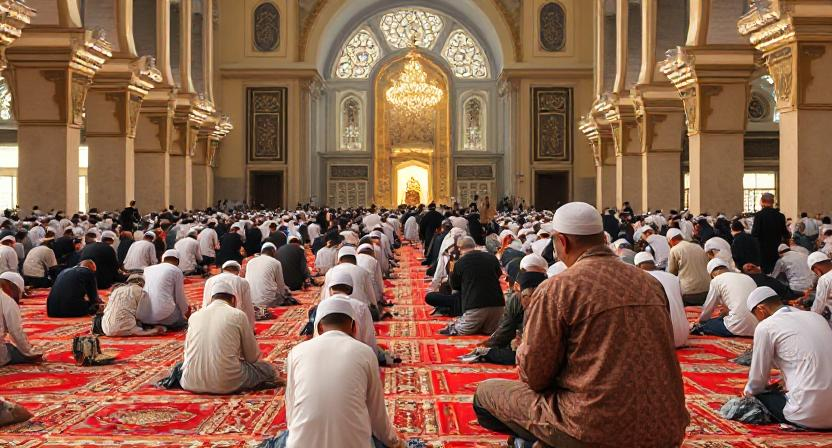The Spiritual Heartbeat of Dubai: Understanding Salah Timings, the Adhan, and the Essence of Rakat
| Date | Day | Hijri | Fajr | Sunrise | Dhuhr | Asr | Maghrib | Isha |
|---|---|---|---|---|---|---|---|---|
| 01 Dec | Mon | 10 Jumada al-Thani | 5:25 AM | 6:43 AM | 12:11 PM | 3:09 PM | 5:32 PM | 6:50 PM |
| 02 Dec | Tue | 11 Jumada al-Thani | 5:26 AM | 6:44 AM | 12:11 PM | 3:09 PM | 5:32 PM | 6:50 PM |
| 03 Dec | Wed | 12 Jumada al-Thani | 5:26 AM | 6:45 AM | 12:11 PM | 3:10 PM | 5:32 PM | 6:50 PM |
| 04 Dec | Thu | 13 Jumada al-Thani | 5:27 AM | 6:45 AM | 12:12 PM | 3:10 PM | 5:32 PM | 6:51 PM |
| 05 Dec | Fri | 14 Jumada al-Thani | 5:28 AM | 6:46 AM | 12:12 PM | 3:10 PM | 5:32 PM | 6:51 PM |
| 06 Dec | Sat | 15 Jumada al-Thani | 5:28 AM | 6:47 AM | 12:13 PM | 3:10 PM | 5:33 PM | 6:51 PM |
| 07 Dec | Sun | 16 Jumada al-Thani | 5:29 AM | 6:47 AM | 12:13 PM | 3:10 PM | 5:33 PM | 6:51 PM |
| 08 Dec | Mon | 17 Jumada al-Thani | 5:29 AM | 6:48 AM | 12:14 PM | 3:11 PM | 5:33 PM | 6:52 PM |
| 09 Dec | Tue | 18 Jumada al-Thani | 5:30 AM | 6:49 AM | 12:14 PM | 3:11 PM | 5:33 PM | 6:52 PM |
| 10 Dec | Wed | 19 Jumada al-Thani | 5:31 AM | 6:49 AM | 12:14 PM | 3:11 PM | 5:33 PM | 6:52 PM |
| 11 Dec | Thu | 20 Jumada al-Thani | 5:31 AM | 6:50 AM | 12:15 PM | 3:12 PM | 5:34 PM | 6:53 PM |
| 12 Dec | Fri | 21 Jumada al-Thani | 5:32 AM | 6:51 AM | 12:15 PM | 3:12 PM | 5:34 PM | 6:53 PM |
| 13 Dec | Sat | 22 Jumada al-Thani | 5:32 AM | 6:51 AM | 12:16 PM | 3:12 PM | 5:34 PM | 6:53 PM |
| 14 Dec | Sun | 23 Jumada al-Thani | 5:33 AM | 6:52 AM | 12:16 PM | 3:13 PM | 5:35 PM | 6:54 PM |
| 15 Dec | Mon | 24 Jumada al-Thani | 5:34 AM | 6:52 AM | 12:17 PM | 3:13 PM | 5:35 PM | 6:54 PM |
| 16 Dec | Tue | 25 Jumada al-Thani | 5:34 AM | 6:53 AM | 12:17 PM | 3:13 PM | 5:36 PM | 6:54 PM |
| 17 Dec | Wed | 26 Jumada al-Thani | 5:35 AM | 6:54 AM | 12:18 PM | 3:14 PM | 5:36 PM | 6:55 PM |
| 18 Dec | Thu | 27 Jumada al-Thani | 5:35 AM | 6:54 AM | 12:18 PM | 3:14 PM | 5:36 PM | 6:55 PM |
| 19 Dec | Fri | 28 Jumada al-Thani | 5:36 AM | 6:55 AM | 12:19 PM | 3:15 PM | 5:37 PM | 6:56 PM |
| 20 Dec | Sat | 29 Jumada al-Thani | 5:36 AM | 6:55 AM | 12:19 PM | 3:15 PM | 5:37 PM | 6:56 PM |
| 21 Dec | Sun | 01 Rajab | 5:37 AM | 6:56 AM | 12:20 PM | 3:16 PM | 5:38 PM | 6:57 PM |
| 22 Dec | Mon | 02 Rajab | 5:37 AM | 6:56 AM | 12:20 PM | 3:16 PM | 5:38 PM | 6:57 PM |
| 23 Dec | Tue | 03 Rajab | 5:38 AM | 6:57 AM | 12:21 PM | 3:17 PM | 5:39 PM | 6:58 PM |
| 24 Dec | Wed | 04 Rajab | 5:38 AM | 6:57 AM | 12:21 PM | 3:17 PM | 5:39 PM | 6:58 PM |
| 25 Dec | Thu | 05 Rajab | 5:39 AM | 6:58 AM | 12:22 PM | 3:18 PM | 5:40 PM | 6:59 PM |
| 26 Dec | Fri | 06 Rajab | 5:39 AM | 6:58 AM | 12:22 PM | 3:18 PM | 5:40 PM | 6:59 PM |
| 27 Dec | Sat | 07 Rajab | 5:40 AM | 6:59 AM | 12:23 PM | 3:19 PM | 5:41 PM | 7:00 PM |
| 28 Dec | Sun | 08 Rajab | 5:40 AM | 6:59 AM | 12:23 PM | 3:20 PM | 5:42 PM | 7:01 PM |
| 29 Dec | Mon | 09 Rajab | 5:41 AM | 6:59 AM | 12:24 PM | 3:20 PM | 5:42 PM | 7:01 PM |
| 30 Dec | Tue | 10 Rajab | 5:41 AM | 7:00 AM | 12:24 PM | 3:21 PM | 5:43 PM | 7:02 PM |
| 31 Dec | Wed | 11 Rajab | 5:41 AM | 7:00 AM | 12:25 PM | 3:21 PM | 5:44 PM | 7:02 PM |
Dubai, a global metropolis known for its innovation and towering structures, also deeply values its Islamic heritage. For the numerous Muslims residing in this dynamic city, the five daily prayers, or Salah, form an essential rhythm to their lives. These prayers transcend mere routine. Instead, they represent a vital and direct connection with Allah (God). Comprehending the precise times for these sacred acts, the profound meaning embedded in the call to prayer (Adhan), and the fundamental structure of each prayer unit (Rakat) is integral to a Muslim’s spiritual journey in Dubai. This detailed exploration will illuminate these core aspects of Islamic worship as practiced in Dubai. We will examine the methods for determining prayer times in this specific location. Furthermore, we will delve into the powerful message conveyed by the Adhan as it echoes across the city. Finally, we will meticulously detail the components that constitute a single Rakat.
A Timetable for Devotion: Observing the Daily Prayers in Dubai
Muslims in Dubai, alongside their counterparts worldwide, adhere to a schedule of five daily prayers. These timings are divinely ordained and intrinsically linked to the sun’s celestial path. Observing these prescribed times signifies a commitment to prioritizing spiritual obligations amidst the demands of daily life in a bustling urban center like Dubai. The five obligatory prayers and their approximate times in Dubai are as follows (please note these times fluctuate slightly throughout the year):
- Fajr (Dawn): This prayer is performed before the first light of dawn appears on the horizon. It marks the spiritual commencement of the day for Muslims in Dubai.
- Dhuhr (Noon): This prayer is offered after the sun reaches its zenith and begins its descent. It provides a moment of spiritual pause during the often-busy midday hours in Dubai.
- Asr (Afternoon): This prayer is performed in the latter part of the afternoon, before the sun begins to set. The specific timing can vary according to different Islamic schools of thought.
- Maghrib (Sunset): This prayer is observed immediately after the sun disappears below the horizon, signaling the end of the day’s daylight.
- Isha (Night): This prayer is performed after the twilight has completely vanished and the darkness of night has fully set in over Dubai.
Accurate prayer times for Dubai are readily available through various sources. These include the Khaleej Times prayer schedule, official websites of religious authorities in the UAE, and numerous mobile applications dedicated to providing prayer timings based on geographical location. Mosques across Dubai also play a crucial role in disseminating prayer times. They often display schedules and broadcast the Adhan to notify worshippers of the prayer’s commencement.
The Melodic Summons: The Power and Meaning of the Adhan in Dubai’s Urban Landscape
Five times each day, the Adhan, or call to prayer, resonates across Dubai. This melodic and powerful proclamation serves as a public invitation for Muslims to congregate at mosques for obligatory prayer. The Adhan is traditionally recited by a Mu’adhin from the mosque’s minaret, although modern technology often amplifies its reach throughout the city. The Arabic words of the Adhan carry profound spiritual significance for Muslims in Dubai and worldwide:
- “Allahu Akbar” (God is the Greatest): This phrase, repeated multiple times, underscores the absolute supremacy and majesty of Allah above all creation.
- “Ash-hadu an la ilaha illallah” (I bear witness that there is no god but Allah): This declaration of faith affirms the fundamental monotheism of Islam, a belief central to the lives of Muslims in Dubai.
- “Ash-hadu anna Muhammadar-Rasulullah” (I bear witness that Muhammad is the Messenger of Allah): This statement acknowledges the prophethood of Muhammad (peace be upon him) and his pivotal role as the final messenger of God.
- “Hayya ‘ala-s-Salah” (Come to prayer): This is a direct and compelling invitation to perform the obligatory prayer, emphasizing its paramount importance in a Muslim’s daily life in Dubai.
- “Hayya ‘alal-Falah” (Come to success): This phrase connects the act of prayer with true success and fulfillment in both this world and the eternal life to come, a message that resonates with Muslims in Dubai navigating a fast-paced environment.
- “Allahu Akbar” (God is the Greatest): Reiterated to reinforce the unparalleled greatness of Allah.
- “La ilaha illallah” (There is no god but Allah): The final affirmation of the oneness of God.
During the Fajr (dawn) prayer in Dubai, the Adhan often includes the additional phrase: “As-Salatu Khayrun Minan-Nawm” (Prayer is better than sleep). This serves as a powerful reminder to prioritize spiritual devotion even over the comfort of sleep, encouraging Muslims in Dubai to begin their day with worship. The Adhan in Dubai’s urban soundscape acts as a constant spiritual anchor, reminding Muslims of their faith and calling them to unity in prayer.
The Building Blocks of Prayer: Understanding the Rakat in Dubai’s Congregations
Each of the five daily prayers observed by Muslims in Dubai comprises a specific number of units known as Rakat. A single Rakat is a structured sequence of physical movements, scriptural recitations, and heartfelt supplications performed by a worshipper. Understanding the proper execution of a Rakat is essential for performing Salah correctly and with devotion in Dubai’s mosques and individual prayers. A standard Rakat involves the following key components:
- Qiyam (Standing): The prayer commences with the worshipper standing, facing the Qibla, the direction of the Ka’abah in Mecca. In this posture, the worshipper recites Surah Al-Fatiha, the opening chapter of the Quran, and often additional verses.
- Ruku’ (Bowing): The worshipper then bows forward, maintaining a straight back with hands placed firmly on the knees. Specific phrases glorifying Allah are recited in this position.
- Qawmah (Standing after Bowing): The worshipper rises from the bowing position and stands upright once more, reciting phrases of praise to Allah.
- Sujud (Prostration): The worshipper then prostrates, placing their forehead, nose, palms, knees, and toes on the ground. This posture signifies utmost humility and closeness to Allah, during which specific supplications and glorifications are recited.
- Jalsa (Sitting): The worshipper rises from prostration and sits briefly before proceeding to the second prostration.
- Second Sujud (Second Prostration): The act of prostration is repeated, with the worshipper reciting similar phrases as in the first Sujud.
- Tashahhud (Bearing Witness): In the final Rakat of a prayer, the worshipper sits and recites the Tashahhud, a declaration of faith and salutations to Prophet Muhammad (peace be upon him).
The number of obligatory (Fard) Rakat for each of the five daily prayers in Dubai is consistent with practices worldwide:
- Fajr: 2 Rakat
- Dhuhr: 4 Rakat
- Asr: 4 Rakat
- Maghrib: 3 Rakat
- Isha: 4 Rakat
In addition to these obligatory Rakat, Muslims in Dubai also observe Sunnah (recommended) and Nafl (voluntary) prayers, which are performed before or after the Fard prayers to seek additional spiritual merit and draw closer to Allah. The Friday congregational prayer (Juma) in Dubai replaces the regular Dhuhr prayer and consists of two Rakat led by the Imam, preceded by the Khutbah (sermon).


